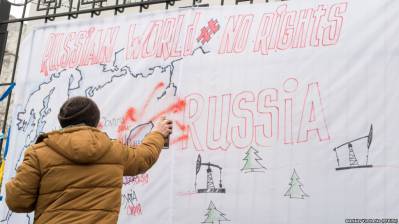Crimean prisoners illegally taken to Russia and ‘retried’

There are at least three Ukrainian prisoners who have been deprived of their right to amnesty under Ukrainian law and taken against their will to Russia where they were effectively ‘re-convicted’ under Russian law. The real number of such prisoners could be much higher.
Dmitry Sotnikov, the lawyer representing Ukrainian political prisoner Oleksandr Kostenko met the three prisoners while visiting Kostenko in the Kirov prison in Russia. The three men Viktor Skoblikov from Mykolaiv; Vladislav Burlaka from Kharkiv and Grigory Larionov had all been convicted of crimes and were serving sentences in Crimea in Feb 2014.
All three refused to accept Russian citizenship. Their Ukrainian citizenship and convictions under Ukrainian law presumably caused the Russian occupier paperwork difficulties, The men should have been sent back to Ukraine. Instead, they were illegally ‘convicted’ again for the same crimes so as to, euphemistically speaking, “bring their sentences into accordance with Russia’s Criminal Code”.
This is in shocking violation of international law and also meant that they were not able to enjoy the amnesty declared in Ukraine. It was only when they began asking for the amnesty that the Russian fiddle became clear. Their applications were met with the response that Ukraine’s laws no longer applied after adoption of the ‘Federal constitutional law of 21.03.2014’ on Crimea’s annexation.
This law, it should be stressed, like the annexation is not recognized by the United Nations or any democratic state.
Ukraine’s General Consul Hennady Breskalenko was recently finally allowed a visit with Oleksandr Kostenko and had announced plans to also see Larionov. The latter was deliberately placed in a punishment cell so that Breskalenko would not be able to meet with him.
Sotnikov has brought appeals from all the prisoners addressed to Ukraine’s Foreign Ministry asking for measures to be taken to ensure their return as soon as possible to Ukraine.
The first alarm bells over this situation were sounded back in June 2014 by the Head of the State Penitentiary Service Volodymyr Starenky. He warned that convicted prisoners in the Crimea were having their sentences forcibly re-qualified under Russian legislation with that almost certainly resulting in many of them losing their chance to release under amnesty. He spoke of 2 thousand prisoners, though how many of them were refusing to take Russian citizenship was not known.
In her 2015 report, the Russian Ombudsperson Ella Panfilova does mention cooperation with her Ukrainian counterpart, Valeria Lutkovska, on issues involving Crimean prisoners. Her language is very vague, and it is not clear what exactly has been done, and how many prisoners have simply been illegally ‘reconvicted’.
Halya Coynash




